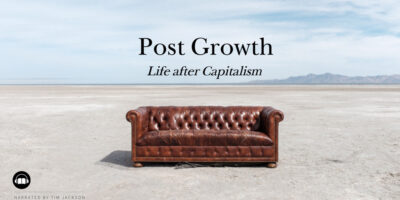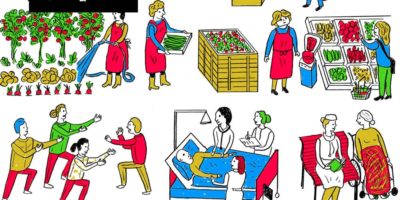‘Everything, in short, except that which makes life worthwhile’
Fifty years on from Robert Kennedy’s historic speech on the limitations of the GDP at the University of Kansas in March 1968, Tim Jackson reflects on the failings of measurement and vision which still haunt both economic policy and our everyday life.
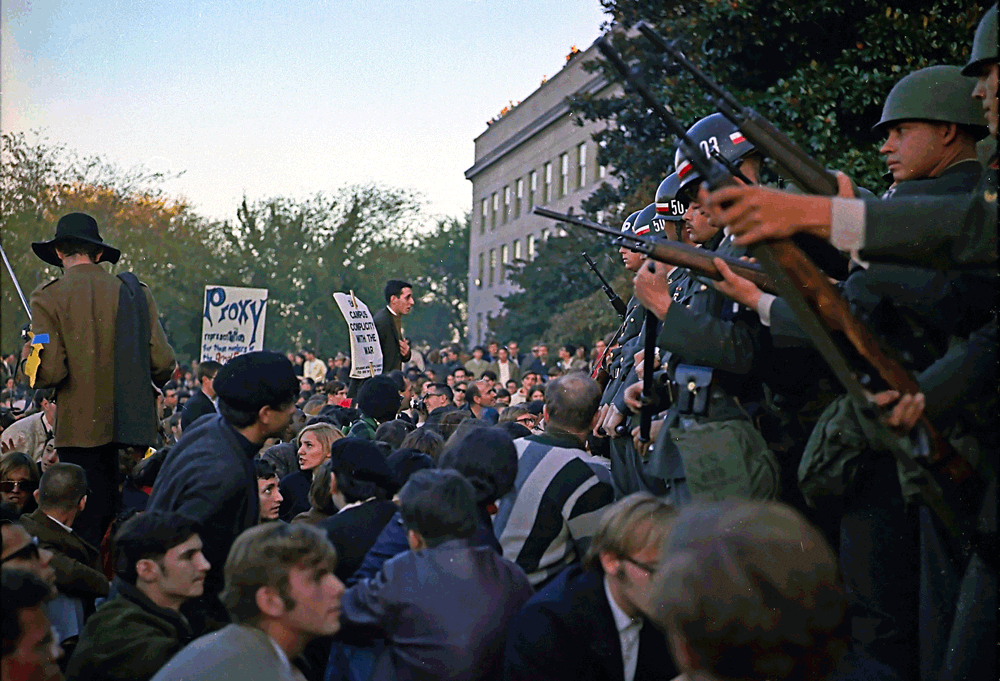
Fifty years ago, on 18th March 1968, Robert F Kennedy gave a speech at the University of Kansas in which he famously questioned the authority of the Gross National Product (nowadays more often called the Gross Domestic Product or GDP) as a legitimate measure of national wellbeing. The GDP ‘measures neither our wit nor our courage, neither our wisdom nor our learning, neither our compassion nor our devotion to our country’, he said. ‘It measures everything in short, except that which makes life worthwhile.’ I was ten years old at the time.
Half a century on, with the world still obsessed with increasing the GDP at almost any cost, it’s worth pausing a moment to reflect on the distance we have travelled—or not travelled—since that March day in Kansas. And on the reflections of a man who, were it not for the assassin’s bullet, might have brought America and the world to its senses five decades ago: measuring the ‘busy-ness’ of the economy and calling that progress never was and never will be the route to a lasting prosperity.
Two days before that Kansas speech, RFK had somewhat tentatively declared his candidacy for the Democratic nomination in the 1968 Presidential Race. Encouraged by the success of the anti-war Senator Eugene McCarthy in the New Hampshire primary a week before, Kennedy had finally been persuaded that his own opposition to the Vietnam war was also best expressed by running against the incumbent President, Lyndon Johnson.
Democrat against Democrat, Senator against President. It seemed like a tough road ahead, and RFK was by no means convinced it would be successful. He wasn’t even sure he still had support amongst the younger generation who had become increasingly disenchanted with the pro-war Democrat government.
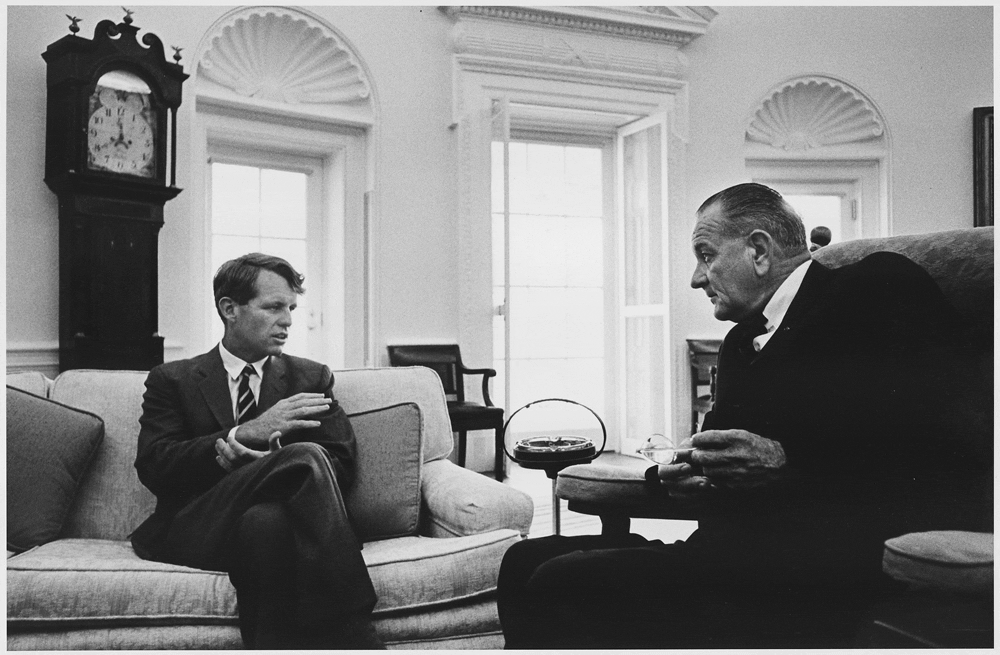
He needn’t have worried. When he stepped off a commercial flight from New York to walk 100 yards across the Kansas City runway to a private jet on the evening of St Patrick’s Day, 17th March 1968, he was besieged by 2,500 thousand supporters who broke a police cordon and charged across the runway, shouting ‘Go Bobby Go’, engulfing Kennedy and his wife Ethel, and demanding a speech.
No rally had been arranged, so there was nothing in the way of a microphone. But Kennedy gamely offered a few remarks to the crowd, little of which could be heard, before stopping. ‘That was my very first campaign speech’, he said. ‘Now let’s all clap.’ Only a few people could hear, but he clapped his hands, the audience clapped theirs, and everyone laughed. It seemed like an auspicious start to a presidential campaign.
But RFK was still noticeably nervous the next morning as he addressed around 14,000 students at Kansas State University, the first of two speeches on his first full day of campaigning. The KSU speech was scripted carefully for the occasion by his long-time advisor and speech-writer, Adam Walinsky. It opened, cleverly, with a quote from the former editor of a Kansas newspaper.
‘If our colleges and universities do not breed [students] who riot, who rebel, who attack life with all the youthful vision and vigour, then there is something wrong with our colleges,’ he said. ‘The more riots that come on college campuses, the better the world for tomorrow.’
It was a candid appeal to the generation who had brought the anti-Vietnam protest movement out of the ghettos and onto the campuses of liberal, middle-class universities across America. Kansas State had not been at the forefront of those riots, but the students in the stadium loved it. According to one eye-witness, the journalist Jack Newfield, Kennedy’s opening salvo was met with a ‘happy roar’. Once he began to talk about Vietnam, the crowd began to clap and cheer and RFK’s nervousness began to fade.
By the time he reached the University of Kansas, a few hours later, he was in a relaxed, almost jocular mood. More than 20,000 people had crowded into the Phog Allen Fieldhouse, home to the college basketball team, spilling onto the yellow court and leaving only a small space for Kennedy to stand. When he finally pushed his way through the crowd to the lectern, he opened with what must have been an entirely unscripted joke.
‘I’m really not here to make a speech,’ he quipped. ‘I’ve come because I came from Kansas State and they want to send their love to all of you. They did. That’s all they talk about over there, how much they love you.’ The sporting rivalry between the two top Kansas universities was legendary. The annual clash between the two football teams had played out fiercely since 1911. The arena erupted in laughter.
The speech that followed was what might affectionately be called a ‘mash-up’. A mixture of ad-lib remarks and occasional jokes, weaving together sections of speeches from previous events, including Walinsky’s prepared script from the morning address at KSU. The short section about the GDP hadn’t been in the morning speech. It probably wasn’t written for this occasion. It was almost certainly part of an older speech, just a meme in the mash-up. But Kennedy’s remarks that day became the poster-speech for a critique of the GDP which has continued to this day.
That critique has mainly focused on the measurement problem: the idea that an accounting framework based around the production and consumption of goods is not a very good measure of economic success. Measurement is a gloriously technical issue. A safe enough space to allow even governments and intergovernmental agencies to approach the problems that Kennedy was alluding to.
At any rate, his Kansas speech is often credited with kick-starting the European Commission’s Beyond GDP programme and the OECD’s global project on Measuring the progress of societies, with its Istanbul declaration, calling for ‘high-quality facts-based information that can be used by all society to form a shared view of societal wellbeing and its evolution over time’. Not quite as poetic as RFK’s rhetoric. Neither was the title of President Sarkozy’s 2009 Commission on the Measurement of Economic Performance and Social Progress.
But the clean language of measurement has allowed even the most conservative politicians to engage ‘safely’ in the debate about the merits and failings of the GDP. When David Cameron launched the UK Office for National Statistics’ National Wellbeing Project in 2010, for example, he even cited Kennedy’s Kansas speech in his defence.
He didn’t of course dwell much on the fact that the seeds for that 2010 project had already been sown by the previous (Labour) administration. Just a few short years before Cameron took up the challenge, I had participated myself, as Economics Commissioner of the UK Sustainable Development Commission, in the snappily named Whitehall Wellbeing Working Group, a strange mixture of radical campaigners and government statisticians who met on a regular basis to see what might be done to devise a more accurate measure of the nation’s wellbeing.
By the time that group was convened, I and a few colleagues had already spent well over a decade exploring the possibility that we could find better measures of social progress than the GDP. Heavily influenced by Herman Daly and John Cobb’s 1989 Index of Sustainable Economic Welfare, we had poured endlessly over the national statistics to find ways to adjust the conventional measure so that it took better account of pollution and crime and car accidents and military spending—the very same deficiencies that RFK highlighted fifty years ago.
The GDP ‘counts air pollution and cigarette advertising, and ambulances to clear our highways of carnage,’ Kennedy told the University of Kansas crowd. ‘It counts special locks for our doors and the jails for the people who break them. It counts the destruction of the redwood and the loss of our natural wonder in chaotic sprawl. It counts napalm and counts nuclear warheads and armored cars for the police to fight the riots in our cities. It counts Whitman’s rifle and Speck’s knife, and the television programs which glorify violence in order to sell toys to our children.’
Our own work was mostly as dull as ditch-water. A million miles from the rhetoric of Kansas. But we drew perhaps some small inspiration from the poetry of that day. I remember the frisson of excitement when we stumbled on an audio recording of RFK’s Kansas speech—it had been discovered years after the event in a basement in the university. The feeling of elation, as though destiny was on our side. To recognise one’s own struggle as a tiny slipstream in the tide of a greater historical change felt glorious.
It’s taken a little more time to realise that the twists and turns of history are never so clear. That the Wonderful Whitehall Working Group was heading rapidly for the political cliff of the 2008 financial crisis. That neither the OECD, nor the European Commission, nor Sarkozy, nor the government I served as Commissioner remotely intended to take seriously the fact that relentless economic expansion on a finite planet is totally unsustainable and increasingly undesirable. That Cameron was only ever going to skim the surface of RFK’s critique.
Even our fixation with that momentous speech turns out to be an artefact of an imperfect history: the relative fog of the pre-digital age combined with the fictitious certainty of the internet. The reference to Richard Speck who raped and murdered 8 student nurses in July 1966 and Charles Whitman, the notorious Texas Tower Killer, who shot and killed 16 people at Texas University in August of the same year, clearly places the roots of RFK’s speech at an earlier point in time than the Kansas campaign trail.
A little exploration reveals that Kennedy had already given a slightly expanded version of the same remarks at a speech in Detroit, in May of the previous year 1967. He was to give it again two months later at a fund-raising dinner in Omaha, shortly before the Nebraska primary and less than a month before his death.
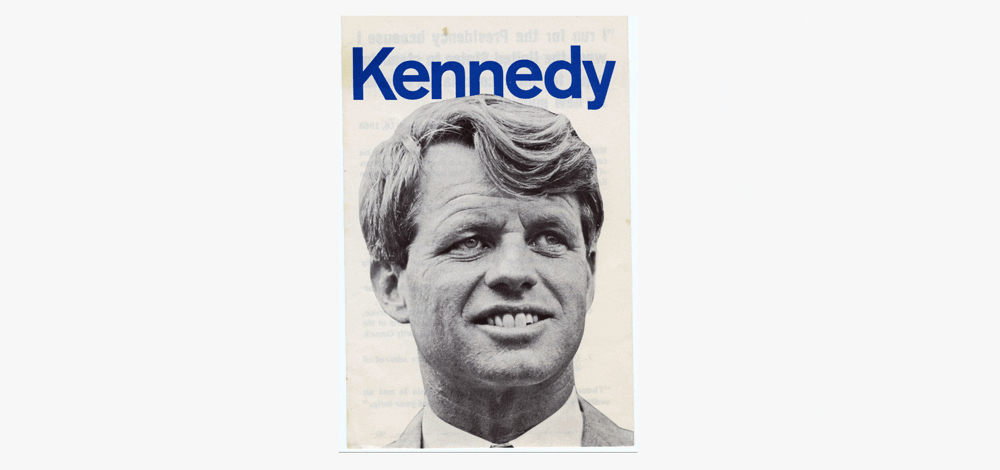
So perhaps this isn’t exactly an anniversary at all. But that isn’t quite the point. Just as measurement was not quite the point. Only a few short minutes of Kennedy’s speech in Kansas was about the GDP. Some of it was a visceral reaction to the rhetoric of war. ‘I don’t want to be part of a government, I don’t want to be part of the United States, I don’t want to be part of the American people,’ he said. ‘And have them write of us as they wrote of Rome: “They made a desert and they called it peace.”’
The underlying core of that Kansas speech, of all his speeches during that ill-fated Presidential campaign, was human values, a burning concern for social justice. He spoke passionately about the grinding poverty he had seen around him, corrupting the very heart of America. He spoke of children in Mississippi with distended stomachs, of poor ghettos with dismal schooling, of the long-term unemployed in the ex-mining communities of Appalachia, of rising suicide amongst indigenous people.
‘I don’t think that’s acceptable,’ he declared. ‘And I think the United States of America—I think the American people, I think we can do much, much better. And I run for the presidency because of that.’
It was a run he was never to finish. RFK was shot and fatally wounded at the end of a long day, a few short weeks later. Shortly after midnight, he had left the podium in the Ambassador Hotel in Los Angeles after thanking his team for their help in the successful California primary, a result that would almost certainly have guaranteed him the Democratic nomination. He was making his way out through the hotel kitchen when Sirhan Sirhan, a disturbed and disaffected 24 year old, shot him three times. He died just over a day later in the Good Samaritan Hospital.
The California primary fell on 4th June that year, 1968. It was my 11th birthday. Unusually, I had not celebrated, because it coincided with the departure of my favourite Aunt, who was leaving the UK for a new life in the USA. As a privilege I was allowed to travel with her and my parents and my grandparents to Southampton docks where we waved her off, a little tearfully, on the evening of 4th June. I remember the sense of sadness, mingled with excitement, that accompanied me on the late-night journey home. I was already beginning to miss her.
My one consolation would be not having to go to school on the following day. And that is how I found myself at home in the living room in front of our tiny black and white television, on the morning of 5th June, trying to make sense of the news coverage from the country my Aunt was traveling to. Never guessing that the man who lay dying on the screen in front of me had already provided such clear foundations for my own professional life.
This may not be an exact anniversary. Nothing turns quite so precisely on a given moment of time. And our sense of the tide of history is elusive at best. But 18th March is still undeniably a point at which to pause for thought. ‘Too much and for too long,’ said Bobby Kennedy, on that day exactly half a century ago, ‘we seem to have surrendered personal excellence and community values in the mere accumulation of material things.’ The struggle to correct that fatal imbalance goes on.

